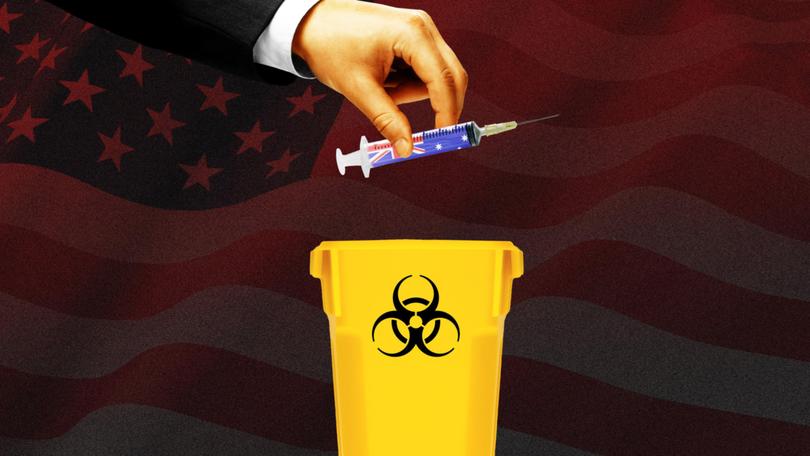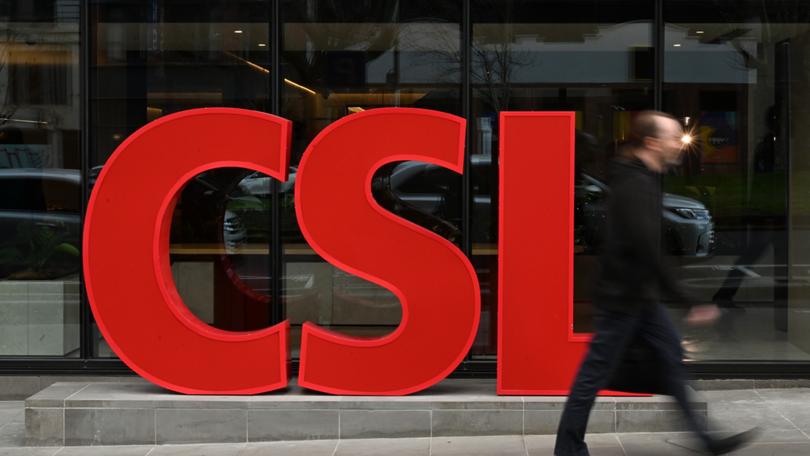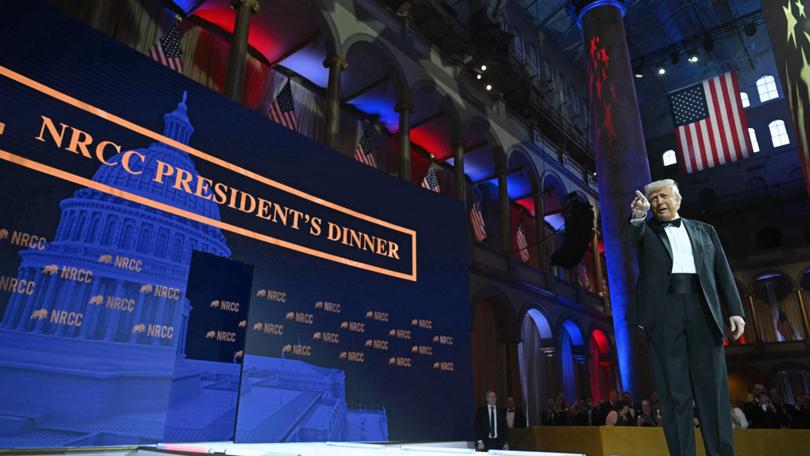Donald Trump tariffs: CSL slumps as President threatens to bring pharmaceuticals into trade war
US President Donald Trump has signalled a tariff on imported pharmaceuticals, a policy that is expected to directly hit Australia’s second-largest export to the US.

US President Donald Trump has signalled his administration will place a tariff on imported pharmaceuticals, a policy that is expected to directly hit Australia’s second-largest export to the US.
Speaking at a Republican Congressional Committee dinner, the President said: “We are going to tariff our pharmaceuticals and once we do that they’re going to come rushing back into our country because we’re the big market.”
The news sent shares in CSL — one of Australia’s largest and most successful companies with a market capitalisation of $119 billion - crashing as much as 5 per cent on the Australian Securities Exchange to $233.62 — its lowest level in more than five years. Other Australian biotechs were similarly dumped.
Sign up to The Nightly's newsletters.
Get the first look at the digital newspaper, curated daily stories and breaking headlines delivered to your inbox.
By continuing you agree to our Terms and Privacy Policy.Pharmaceuticals were originally exempt from tariffs in Mr Trump’s “Liberation Day” plan but that policy appears set to change.
“We’re going to be announcing shortly a major tariff on pharmaceuticals, and when they hear that they will leave China, and they will leave other places because more of the product is here,” he said.
The shock announcement comes as the Trump administration’s “reciprocal” tariffs — actually a levy based on trade imbalances — went into effect overnight in the US (2PM AEDT).
Among those tariffs was a new, additional levy of 50 per cent on Chinese goods in retaliation for China applying a 34 per cent tariff on US imports. That took the total tariff on Chinese products to 104 per cent.
The imposition of the highest US tariffs on trade partners in a century includes 10 per cent on Australia, with the European Union receiving a 20 per cent rate, Vietnam 46 per cent and Cambodia 49 per cent.

The United States accounts for 50 per cent of total pharmaceutical sales, and is CSL’s largest market amid total revenues of $US14.8 billion ($24.7b) in 2024. A signficant portion of CSL’s revenues in the US are pharmaceuticals exported from Swiss plants and if the tariff on pharmaceuticals is applied at the country level, will attract a levy of 31 per cent.
The shock to one of Australia’s most successful company is a microcosm of the catastrophic global impact of a tariff regime that is the signature policy of Mr Trump.
“Many countries have they’ve ripped us off left and right, but now it’s our turn to do the ripping,” he told the crowd, while also mocking foreign leaders for attempting to negotiate deals.
“I’m telling you, these countries are calling us up, kissing my ass. They are. They are dying to make a deal. Please, please, sir, make a deal. I’ll do anything,” he said.
Mr Trump’s speech also confirmed his commitment to a tariff vision that simultaneously raised revenue, forced re-shoring of manufacturing, and was central to his plan to lower income taxes.
“We’re making a fortune with tariffs, $2 billion a day,” he said.
The tariff revenue, combined with spending cuts via DOGE would “give people the biggest tax they’ve ever had”.
“It’ll blow away the tax cuts that we got them four years ago. If we follow through on this agenda, we will be rewarded with a phenomenal economy and a massive victory at the ballot box in 2026,” the President said.

While the President’s agenda is focused on domestic politics, the complete reordering of the international trading system is increasingly damaging global growth forecasts.
Since the tariffs were announced, sharemarkets have been in freefall, with the ASX200 falling almost two per cent by the close. Australian shares are now down 14 per cent from their February peak.
The Australian dollar has continued to be sold off, now down to a five year low and briefly nearing 59 US cents.
“An Australian Dollar trading around the 59 handle is not just a portent for the Australian economy, but also the rest of the world: it’s only happened three times in the past 25 years: during the COVID-19 recession, the Global Financial Crisis, and following the bursting of the dot.com bubble,” said Kyle Rodda, Senior Financial Market Analyst at Capital.com
Also worrying investors is a big sell-off on global bond markets — described as a “shit storm” by one major trader, who said the market had not been roiled to this degree since the pandemic.
Up until the most recent tit-for-tat tariff stand=off with China, bonds have been a safe haven for investors. But they are now selling off long-dated US Treasuries, a sign of concern about the longer term prospects for the global economy and fears tariff-induced inflation will prevent the US Federal Reserve from cutting interest rates.
Markets are now anxiously watching China’s response to 104 per cent tariff, but the rhetoric suggests it will not be cowed by this latest impost.
“The US threat to escalate tariffs on China is a mistake on top of a mistake, which once again exposes the U.S.’s blackmail nature,” China’s commerce ministry said. “If the U.S. insists on its own way, China will fight to the end.”
Westpac’s head of international economics, George Elliot said China had a greater financial capacity to withstand US tariffs but its continued strength, plus its ability to build alliances across the region might exacerbate the fight.
“China strengthening its position in the world is also likely to raise the ire of the US, perpetuating geopolitical uncertainty and market volatility all the more so if the US economy experiences a prolonged period of weak growth and domestic political uncertainty.
“In addition to their economic and political position, China’s dominance in global shipping and global port infrastructure, as well as China’s holdings of US Treasury securities are additional potential flashpoints with the US. These are wide ranging risks, which require regular careful study,” Mr Elliot said.
The repercussions of the trade war are still being calculated, but each wrench of global trade levers has widespread spillover effects.
As part of its retaliation, China has banned the importation of US beef, which may become a bargaining chip for Japan and Korea as they attempt to get a tariff exemption. Japan is the third largest market for Australian beef, buying high value cuts and any deal to preference US beef by Japan would hurt Australian producers.
The Australian biotech sector, which employs 350,000 across 2900 organisations called on the Government to form a National Life Sciences Council to address the implications of the “rapidly changing trade environment”.
Australian medical products have been the greatest value added export since 2016, and “compete in global markets and operate within what are complex international supply chains that connect and drive the sector worldwide.”
“In this period of ongoing global change, collaboration between industry and government has never been more important,” AusBiotech CEO, Rebekah Cassidy said.

